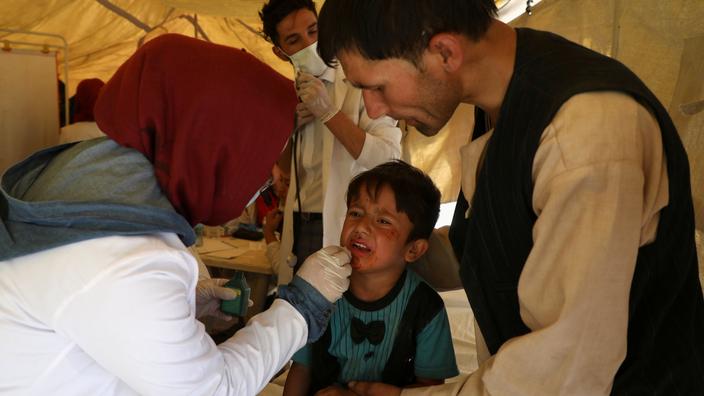In an Afghanistan beset by instability caused by the escalation of fighting in recent weeks, civilians find themselves in a stranglehold.
Some choose to flee, but most have no choice but to anxiously await the end of hostilities.
The meteoric advance of the Taliban took NGOs based in the various provinces of the country by surprise.
Helping people when open conflict escalates is often a feat.
The obstacles to the action of humanitarians come first of all from the rapprochement of military operations with urban infrastructures.
Clashes have multiplied in the heart of cities where international aid is generally coordinated.
In Kunduz, Kandahar, Lashkar Gah and even Herat, the fighting raged as close as possible to the civilian populations: “
the humanitarian consequences are more serious when the fighting takes place in the city centers.
The same type of weaponry, aerial bombardments and the use of explosive devices have greater impacts in densely populated areas,
”said Eloi Fillion, head of the delegation of the International Committee of the Red Cross in the country.
Read also: Afghanistan: the Taliban take Lashkar Gah, capital of Helmand
Logistical complications
Clashes ever closer to homes raise fears of a humanitarian disaster.
Three direct consequences are to be deplored.
First of all, with the destruction of homes: “
people flee to seek shelter in the same city, or move to other cities.
Of the people who flock to Kabul, many come from Kunduz,
”explains Eloi Fillion.
The destruction of civilian infrastructure linked to energy production and water supply systems is also having disastrous effects. For Marianne O'Grady, director of CARE in Afghanistan, “
what is most difficult to manage is the arrival of thousands of people fleeing the war zones. They find themselves completely destitute. These are the primary needs that are most difficult to meet.
"
For the head of the Red Cross, the heaviest consequence of the rapprochement of the fighting affects health structures.
"
They can be made inoperative or difficult to access because they become inaccessible for staff and patients
" deplores Eloi Fillion.
“
The orthopedic structure of our body in Lashkar Gah ended up directly on a front line and received several mortar shells.
In this case we suspend our operations.
"
NGOs are fully aware of the dangers of practicing in conflict zones.
These are in constant contact with the various parties and call for respect for humanitarian organizations and international law.
"
When the fighting started, we saw the number of patients for wounds caused by shells and bullets explode, MSF has counted more than 600 since the beginning,
" testifies Tom Casey, head of the organization in Afghanistan.
He continues: “
of the 127 injured in recent days, 27 were under 16 years old.
In Kandahar, the fighting was so intense that we had to suspend operations to shelter our personnel before resuming them.
It is stressful for people but we are used to it, we focus and we are dedicated to treating patients.
"
Staff fears and uncertainties
For NGO employees, the difficulty of acting in the field goes hand in hand with the fear of the future. Marianne O'Grady echoes these concerns: “
More than 95% of our staff in the field are of Afghan origin. For many, these are young people who have career prospects. Quite often they live in urban areas and have been brought up for the past twenty years with a certain idea of freedom. They are obviously afraid because they know the stories of their parents and their grandparents on the Taliban past of Afghanistan, they do not want to live that.
"
These mainly Afghan staff are considering leaving the country.
But obtaining a visa can take several months and it is often the most qualified people who can claim to obtain one.
“
Our Afghan colleagues are subject to certain anxieties, they also suffer from the consequences of the fighting.
I have friends in Kandahar who had to spend the night in their cars with their families.
Some will try to leave the country because they fear reprisals because of their religion or their belief
”, confirms Eloi Fillion.
For the women who work in these NGOs, the situation becomes more difficult as the Taliban advance.
“
For now we can continue our activities in areas controlled by the Taliban when the fighting stops.
But we expect more restrictive rules.
The Taliban already forbid women to leave their homes without a "maharam" (a close male relative),
"said Thomas Nobre, deputy director of Action Against Hunger in Afghanistan.
The NGOs are perplexed about the continuation of the operations.
If they can still exercise without too much difficulty in areas that have passed under Taliban domination, the problem remains the lack of visibility at the level of the administration in the coming months.
The overwhelming pressure of the Taliban in recent days casts doubt on an imminent fall of Kabul. “
We are preparing for it because it has already happened, we are preparing for all possible scenarios. We can reduce the size of our teams over a period of time, and we also have security protocols to take shelter in case the violence escalates. But above all, the Red Cross has established an active dialogue at the political and military level,
”reassures Eloi Fillion.

